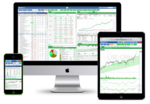Description

FactSet

FXCM
Comprehensive Overview: FactSet vs FXCM
FactSet and FXCM are both significant entities within the financial services industry, yet they serve distinct functions and target different markets. Here’s a comprehensive overview of each:
FactSet
a) Primary Functions and Target Markets
- Primary Functions: FactSet is a leading provider of integrated financial information and analytical applications. It offers a comprehensive suite of data and analytical tools that cater to investment professionals. Key functionalities include portfolio analytics, trading solutions, risk management, market data, and financial research.
- Target Markets: FactSet primarily targets institutional investors, asset managers, hedge funds, investment bankers, and various financial analysts who require robust data and analytics tools to make informed investment decisions. Its solutions are tailored for buy-side and sell-side firms.
b) Market Share and User Base
- Market Share: FactSet is a major player among financial data providers, though it competes with large entities like Bloomberg and Refinitiv. It maintains a strong presence due to its focus on customized solutions and technological integrations.
- User Base: FactSet serves thousands of clients globally, including investment managers, financial institutions, and other corporations. It has a loyal client base due to its user-friendly interfaces and comprehensive service offerings.
c) Key Differentiating Factors
- Integration and Customization: FactSet offers highly customizable solutions, allowing firms to tailor the platform to their specific needs.
- Data Breadth and Depth: Known for its extensive datasets which include a vast range of financial metrics, FactSet provides in-depth coverage that's crucial for detailed analysis.
- Client Service: FactSet is well-regarded for its customer service and technical support, which often includes dedicated teams for client assistance.
FXCM
a) Primary Functions and Target Markets
- Primary Functions: FXCM (Forex Capital Markets) is primarily a retail foreign exchange broker. It offers online trading services in Forex, Contracts for Difference (CFDs), and commodities. The platform provides tools such as trading platforms, charting tools, and educational resources for traders.
- Target Markets: FXCM targets individual traders, retail investors, and smaller institutional clients who engage in online trading activities. The platform is suitable for both novice and experienced traders due to its range of educational content and varying account types.
b) Market Share and User Base
- Market Share: FXCM is one of the well-known names in the retail forex brokerage market, although it faces stiff competition from brokers like IG Group, Saxo Bank, and OANDA. Its market share varies significantly by region due to differing regulatory landscapes.
- User Base: FXCM has thousands of active accounts spanning numerous countries. Despite facing challenges related to regulatory actions in the past, it maintains a substantial share of the forex trading market.
c) Key Differentiating Factors
- Regulatory Compliance and Global Reach: FXCM is regulated in multiple jurisdictions, providing security and assurance to its clients. However, it has faced some regulatory challenges historically, particularly in the U.S.
- Trading Platforms and Tools: FXCM offers proprietary platforms like Trading Station, as well as MetaTrader 4, catering to diverse trading styles and preferences.
- Educational Resources: FXCM invests significantly in educating its users, offering various online tutorials, webinars, and trading guides.
Conclusion
In essence, FactSet and FXCM operate in different sectors of the financial industry. FactSet excels in financial data and analytics for institutional clients, focusing on integration and depth of data. FXCM, on the other hand, is dedicated to retail trading in the forex market, emphasizing accessible platforms and user education. Each company’s strength lies in catering to the specific needs of its respective clientele with tailored products and services.
Contact Info

Year founded :
1978
Not Available
Not Available
United States
Not Available

Year founded :
1999
Not Available
Not Available
United Kingdom
Not Available
Feature Similarity Breakdown: FactSet, FXCM
FactSet and FXCM are both prominent platforms in the financial sector, but they serve somewhat different purposes. FactSet is primarily a financial data and software company that provides integrated data solutions for investment professionals, while FXCM (Forex Capital Markets) is an online foreign exchange and CFD broker. Despite these differences, there are some core features they might have in common, as well as distinct differences in their user interfaces and unique features.
a) Core Features in Common
Both FactSet and FXCM, despite their different focuses, share several core features typical of financial platforms:
-
Real-Time Data:
- Both platforms provide real-time data feeds. FactSet delivers extensive market data across equities, fixed income, derivatives, and more, while FXCM focuses on forex and CFD markets.
-
Market Analysis Tools:
- They offer robust analytics tools. FactSet’s platform includes tools for financial modeling, backtesting, and valuation analysis. FXCM offers trading analytics, technical indicators, and charting tools for the forex market.
-
Customizable Dashboards:
- Both platforms provide customizable interfaces where users can create and save their personalized layouts for better data visualization and analysis.
-
Research and Insights:
- Each platform provides access to research and insights. FactSet aggregates financial news, company reports, and research analysis. FXCM offers forex analysis, tips, and market news.
-
API Integration:
- Both platforms support API integration to allow users to connect their proprietary applications or extract data for customized uses.
b) User Interface Comparison
-
FactSet:
- The FactSet user interface is designed for comprehensive financial analysis and might seem complex to new users, but it's highly valued for its depth and breadth. It integrates seamlessly with applications like Excel, enabling advanced data manipulation. It is often used on desktops/laptops with large screens to facilitate extensive data display.
-
FXCM:
- FXCM's interface, especially the Trading Station platform, is tailored to active traders. It focuses on ease of executing trades alongside powerful charting tools and real-time analytics. It's often optimized for both desktop and mobile use, providing a more streamlined interface suitable for quick decision-making and trading.
c) Unique Features
-
FactSet Unique Features:
- Extensive Financial Database: FactSet offers a comprehensive database covering global financial and economic data, which is far broader than forex and CFDs.
- Integration with Office Tools: Advanced integration capabilities with Microsoft Office Suite, especially Excel, enable sophisticated model-building and analytical functions.
- Alternative Data Services: Provides access to alternative data like social sentiment, weather, and satellite data for more advanced predictive analysis.
-
FXCM Unique Features:
- Enhanced Trading Platforms: FXCM offers specialized platforms like the Trading Station, MetaTrader 4, and NinjaTrader, catering specifically to active traders, each with different tools and capabilities.
- Leverage Features: Allows users to trade with leverage, which is a key feature for forex and CFD trading but not applicable in the same way on FactSet as it's not a trading platform.
- Automated Trading Capabilities: Offers automated trading solutions through APIs or partnerships, relevant for users who implement algorithmic trading strategies.
In summary, while both FactSet and FXCM provide valuable data and tools for financial analysis, their core functionality targets different market needs—FactSet focuses on comprehensive financial analytics across various sectors, whereas FXCM is dedicated to trading and market access for forex and CFDs. Their unique features reflect these focuses, serving distinct user groups within the financial industry.
Features

Market Data Solutions
Client Support
Portfolio Management
Analytics and Insights

Comprehensive Trading Platforms
Advanced Trading Tools
Educational Resources
User-Friendly Trading Platform
Reliability and Support
Best Fit Use Cases: FactSet, FXCM
FactSet and FXCM serve different types of financial data and trading needs, making them suitable for distinct use cases. Here's a breakdown of their best fit use cases:
FactSet
a) For what types of businesses or projects is FactSet the best choice?
-
Investment Management Firms:
- Portfolio Management: FactSet offers detailed analytics and risk management tools that are essential for portfolio managers to make informed decisions.
- Research and Analysis: Investment analysts benefit from FactSet's comprehensive data feeds and research capabilities, helping them perform in-depth equity, fixed income, and multi-asset analysis.
-
Corporate Finance Teams:
- Mergers and Acquisitions (M&A): FactSet provides tools for deal screening, market analysis, and financial benchmarking which are crucial for M&A activities.
- Strategic Planning: Companies utilize FactSet for data-driven decision-making and strategic planning by leveraging its extensive databases and analytics capabilities.
-
Investment Banks:
- Equity Research: FactSet supports equity research teams in providing accurate and expansive data for company valuations and market forecasts.
- Risk Management and Compliance: The platform offers tools that help in assessing and managing financial risks and ensuring compliance with regulatory requirements.
-
Consulting Firms:
- Business Consulting: Consultants use FactSet for market analysis, trend forecasting, and competitive analysis, enabling them to deliver insights tailored to various industries.
-
Universities and Academic Institutions:
- Research and Education: Academic institutions leverage FactSet for research and as a teaching tool in finance-related courses.
FXCM
b) In what scenarios would FXCM be the preferred option?
-
Retail Forex Traders:
- Forex Trading: FXCM is particularly designed for retail traders who are focused on foreign exchange markets. It offers user-friendly trading platforms with competitive spreads and leverage options.
-
Day Traders and Scalpers:
- High-Frequency Trading: FXCM provides the order execution speed and charting tools that day traders and scalpers require for their fast-paced trading strategies.
-
Trading Educators and Coaches:
- Educational Platforms: Educators using FXCM can leverage real-time data, demo accounts, and educational resources to teach trading strategies and market concepts.
-
Algorithmic Traders:
- API Access and Automation: FXCM offers API access that allows algorithmic traders to connect their automated trading strategies and systems to execute trades efficiently.
-
SME Proprietary Trading Firms:
- Resource Efficiency: Small to medium-sized proprietary trading firms benefit from FXCM's cost-effective trading solutions and reliable execution.
d) How do these products cater to different industry verticals or company sizes?
-
FactSet:
- Industry Vertical Focus: FactSet primarily serves the financial services industry (investment management, banking, consulting) but also caters to corporate finance teams within large enterprises.
- Scalability: FactSet is well-suited for large enterprises and institutional clients due to its extensive and customizable offerings, which may be cost-prohibitive for smaller firms.
-
FXCM:
- Industry Vertical Focus: FXCM focuses on the trading industry, particularly forex and CFD trading, making it a niche product for trading-focused entities.
- Scalability: FXCM is accessible to individual retail traders and small to medium-sized trading firms. It scales well for SMEs due to its lower cost structure and user-friendly access to financial markets.
In summary, FactSet is ideal for entities that require comprehensive financial data and analytics, while FXCM is best suited for active traders and small trading firms focused on the forex and CFD markets. Each platform caters to different aspects of the financial industry, with FactSet addressing broader financial data needs and FXCM focusing on trading execution and market access.
Pricing

Pricing Not Available

Pricing Not Available
Metrics History
Metrics History
Comparing undefined across companies
Conclusion & Final Verdict: FactSet vs FXCM
To provide a comprehensive conclusion and final verdict on FactSet and FXCM, it is important to compare both platforms based on their features, functionality, and target users.
a) Considering all factors, which product offers the best overall value?
FactSet and FXCM cater to different aspects of the financial market. FactSet is a financial data and software company that provides integrated data and software solutions for investment professionals. It's designed for comprehensive financial analysis, research, risk management, and portfolio management.
FXCM (Forex Capital Markets) primarily offers online trading in foreign exchange (Forex) and related services. It is focused more on the needs of traders who want to engage in Forex, CFDs, and other derivative markets.
In terms of overall value:
- FactSet would offer the best value for institutional investors, analysts, and portfolio managers who require a broad suite of financial data and advanced analytical tools. Its products are suitable for detailed equity research and financial modeling.
- FXCM provides significant value to individual traders or small investment firms focused on currency and derivative trading because of its specialized trading platforms and educational resources.
The best value depends on the specific needs of the user. For comprehensive financial analysis and investment management, FactSet is more suitable. For active trading in the currency and derivative markets, FXCM is more appropriate.
b) What are the pros and cons of choosing each of these products?
FactSet
Pros:
- Comprehensive and integrated financial data and analytics.
- Advanced tools for financial modeling and portfolio management.
- Wide range of asset coverage, including equities and fixed income.
- Strong customer support and customizable services.
Cons:
- Can be expensive, particularly for small firms or individual users.
- Steep learning curve due to the complexity of its tools and functionalities.
- May offer more features than needed for users focused solely on Forex trading.
FXCM
Pros:
- User-friendly trading platforms suitable for Forex and CFDs.
- Offers educational resources and trading tools for both beginners and experienced traders.
- Competitive spreads and leverage options.
- Efficient execution of trades and reliable customer support.
Cons:
- Primarily focused on foreign exchange, so limited functionality for broader financial analysis.
- May be less suitable for institutional investors requiring in-depth equity research or fixed-income analysis.
- Risk of high leverage, which can lead to significant losses.
c) Are there any specific recommendations for users trying to decide between FactSet vs FXCM?
-
Define Your Needs: Understand what you need most out of the financial software or trading platform. For detailed financial analysis and asset management, FactSet is the superior choice. For active trading in Forex and leveraging trading opportunities, FXCM would be more appropriate.
-
Evaluate Budget Constraints: Since FactSet can be significantly more expensive, especially for smaller players or individuals, it is important to weigh the cost against the potential benefits. FXCM offers more budget-friendly options for traders.
-
Trial Periods and Demos: Utilize trial periods, demos, or free versions (if available) to gauge which platform better suits your workflow and needs.
-
Consider Future Needs: Think about your long-term requirements and scalability. FactSet might offer functionalities that can be useful as your financial analysis needs grow. If your goal is to eventually engage in more sophisticated financial analysis, starting with FactSet might be beneficial.
-
Consult With Peers: Seek advice from colleagues or industry experts who may have experience with either or both platforms.
In conclusion, choosing between FactSet and FXCM should primarily depend on the specific needs and goals of the user, with careful consideration of the pros and cons of each platform.




